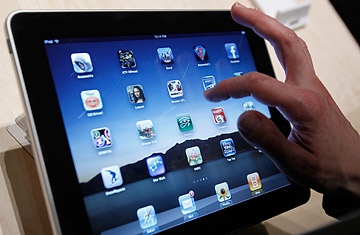
Apple's iPad
Apple rarely mentions its iPad without affixing two adjectives: magical and revolutionary. That's Steve Jobs' classic reality-distortion field at work. And yet, it's also not that far from the simple truth. This tablet is clearly a better rough draft of the future of personal computing than any PC or Mac. And with Apple selling 3 million iPads in the first 80 days, it's a blockbuster that the rest of the industry is rushing to emulate.
A few weeks ago, I rounded up 32 current, future and rumored iPad alternatives. Still more have surfaced since then. A few of the upcoming contenders are intriguing, like Cisco's Cius, a mobile-video-conferencing slab meant for worker bees. More, however, look less like iPad killers and more like wannabes that aren't the least bit magical or revolutionary. They're placeholders until more sophisticated counterparts to Apple's tablet are ready.
That the iPad seems to have taken so many of Apple's competitors by surprise is, well, surprising. It's not like the tablet wars began when the gadget hit stores on April 3, or even when Jobs revealed it at a San Francisco event on Jan. 27: an array of proto-iPads have come and gone over the past two decades, from 1989's GRiDPad to the Tablet PCs, which Microsoft once declared would overtake traditional desktops and laptops by 2005. (Um, no.) And technophiles started fantasizing about a giant iPhone nearly the moment Apple entered the phone business in 2007.
To be fair, Microsoft CEO Steve Ballmer managed to unveil an answer to the iPad three weeks before Jobs did his unveiling. At January's Consumer Electronics Show, Ballmer introduced the concept of Slate PCs — touchscreen tablets that run Windows 7. He brandished a prototype from HP and declared that it was "perfect — perfect for reading, for surfing the Web and for taking entertainment on the go."
But that demo turned out to be the Slate PC's one moment of glory to date. In April, HP agreed to buy Palm, maker of the nifty WebOS mobile operating system and abruptly stopped talking about its still unreleased Windows tablet. Months passed before the company confirmed that it still planned to ship the Slate this year. While in limbo, it morphed from an entertainment-oriented device into one aimed at business folk, and it will be followed by a WebOS tablet in early 2011.
HP plunking down more than $1 billion for its own tablet operating system was unexpected, yet far from inexplicable. For three decades, nearly every computer manufacturer that isn't named after a piece of fruit has outsourced the software side of its products to Microsoft and allowed its own skills to atrophy. Putting the mouse-and-keyboard-centric Windows 7 on touchscreen tablets, however, is a stopgap. Tablets need operating systems designed from the ground up for small screens and fingertips, like Apple's iOS.
And Microsoft's response to the iPhone isn't an encouraging case study. True, Windows Phone 7, its first real post-iPhone smart-phone operating system, looks slick and inventive. But handsets that sport it won't show up until November or so, almost three and a half years after the iPhone's debut. If Ballmer & Co.'s answer to the iPad were to gestate for that long, it wouldn't pop until late 2013.
That helps explain why HP is far from the only hardware builder that's hedging its tablet bet. Asus, Samsung and Toshiba are readying Windows tablets for release by the end of 2010. They're two-timing Microsoft, though, by simultaneously readying models that run Google's Android operating system, like Samsung's Galaxy Tab.
For any one company, coming up with even a single formidable iPad challenger will be tough. And time is short: if Apple follows its typical development schedule, Jobs will stride onto a stage with a second-generation tablet no later than the spring of 2011. (One rumor — which strikes me as unlikely, though not unthinkable — says there could even be a camera-equipped iPad for this holiday season.) It'll be galling for every other manufacturer — and utterly predictable — if the iPad's first serious competitor turns out to be another iPad.
Before I go, a personal note: this is my first TIME.com column. I'm delighted to be here and look forward to seeing you here every Tuesday. If you like what you read, please drop by my site for more Technologizer all week long.
McCracken blogs about personal technology at Technologizer, which he founded in 2008 after nearly two decades as a tech journalist. His column appears every Tuesday on TIME.com.
